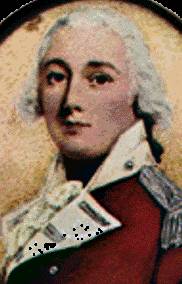John Pitcairn
| John Pitcairn | |
|---|---|
 |
|
| Birth name | John Pitcairn |
| Born |
28 December 1722 Dysart, Scotland |
| Died | 17 June 1775 (aged 52) Boston, Massachusetts, British America |
| Buried at | Old North Church, Boston, Massachusetts, U.S. |
| Allegiance |
|
| Service/branch | HM Marine Forces |
| Years of service | 1746–75 |
| Rank | Major |
| Battles/wars | |
| Spouse(s) | Elizabeth Dalrymple |
French and Indian War
American War of Independence
Major John Pitcairn (28 December 1722 – 17 June 1775) was a Scottish Marine officer who was stationed in Boston, Massachusetts, at the start of the American War of Independence.
Pitcairn was born in 1722 in Dysart, a port town in Fife, Scotland. His parents were the Reverend David Pitcairn and Katherine (Hamilton) Pitcairn. He entered the Royal Marines, was commissioned as a lieutenant in 1746, served in Canada during the French and Indian War as a captain, and was promoted to major in 1771. In 1774 he arrived in Boston, Massachusetts, in command of 600 British Marines assigned to support the British forces in the increasingly restive colony.
John Pitcairn was respected by the citizens in Boston as one of the more reasonable officers in the occupying force. He was in command of the advance party that marched on Lexington and Concord on 19 April 1775, which began the American War of Independence. His horse was shot from under him, and he lost a pair of matched pistols when the column's baggage was abandoned. Patriot leader Israel Putnam would carry them through the rest of the war.
At the Battle of Bunker Hill two months later, Major Pitcairn commanded a reserve force of about 300 Royal Marines. They landed at the south end of the Charlestown peninsula. When the first assaults failed, Pitcairn led his men up the hill toward the American position, only to fall victim to a musket shot, said to have been fired by a former slave named Peter Salem. He toppled into the arms of his son, William, also a Royal Marine officer, who cried out, "I have lost my father!" Some Marines tried to console the son, while others, overcome with emotion, openly wept. Pitcairn was carried back to Boston, where he died of his wound within hours. He is buried at the Old North Church in Boston.
...
Wikipedia
